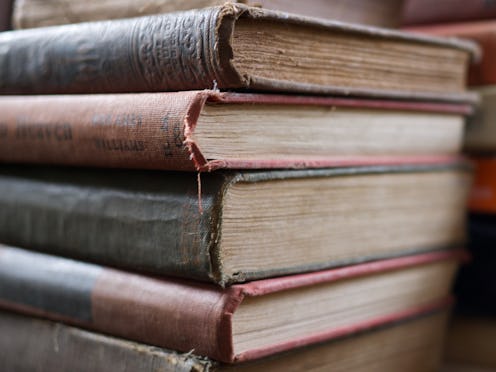
Every book nerd has looked at her bookshelf, with all its thrift store finds and oddities, and thought, How can I tell how much my books are worth? Even if you don't plan to sell your books, it can be fulfilling just to know their value. Recently, an anonymous donor willed his entire book collection to the Wilson Public Library in Cozad, Nebraska; Library Director Laurie Yocom estimated the total donation value at $15-20,000. The generous donation is a dream come true for any book nerd: to have a valuable collection and to be able to do good with it.
But how can you tell how much your books are worth? It's a fair question, and not one whose answer is readily apparent. You almost never see books pop up on Antiques Roadshow. Used book prices are fickle on sites like eBay and Amazon, and — because there are so many variables that determine a book's appraisal value — one copy of a book may sell for hundreds more than another, with only minor differences in condition.
Whether you want to sell books, insure your collection, or are just curious about the total value of your home library, there are plenty of resources online to help you find out how much your books are worth. Here are three easy ways to appraise the paper products in your life.
Check Used Book Prices Online
Searching for other copies of your books online is, by far, the easiest way to get a sense of how much your book collection is worth. Rare book collector Adam Weinberger recommends using an aggregate search to find book prices at multiple online vendors. Price comparison website AddALL has a rare and out-of-print books search, which you may find useful. If you know your book is very rare, you may consider searching for it at The Antiquarian Booksellers Association of America (ABAA), or in AbeBooks' rare book section.
Contact a Specialist
Those of you with niche books should consider contacting a specialist with the ABAA. Someone who works closely with, say, art nouveau journals, may be able to give you a more accurate estimate on your great-grandmother's French poster books than a general appraiser would. Even if they do not personally appraise items — as some booksellers do not, for ethical reasons — specialists will almost certainly be willing to give you the contact information of a trusted appraiser.
You might also have luck at a nearby public or academic library, or museum. Many institutions have rare book collections maintained by small, dedicated teams, whose members will often be willing to look over your materials. Remember: a short, polite email goes a long way when you want to speak with someone whose time is valuable.
Find an Appraiser
If you live in a rural area, as I do, finding a qualified appraiser can be a daunting task. Obviously, it's imperative that you do not trust your book collection with just anyone. That means no going to your local antique stores, unless you know for a fact that the owner is a trustworthy dealer in rare books. Find a book appraiser, preferably one who frequently handles the kind of books you own. When you're spending several hundred dollars on an appraisal, you should find the most knowledgeable person possible.
The Appraisers Association of America website features a dedicated search for book and manuscript appraisers, and you can easily find a similar specialist through the American Society of Appraisers — just select "books and manuscripts" under the ASA Specialty heading. AbeBooks allows sellers who are members of rare book societies to advertise their appraisal services. If you have a favorite place to purchase used books online, check to see if they offer appraisal services; so long as your items are not particularly old or specialized, you should have luck with a general book appraiser.
So, go through that collection! Find those rare books! You may just have extra-special treasures on your hands, after all...
Images: Austin Kirk/Flickr; Giphy (3)